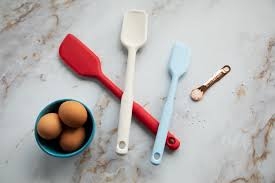Will a Silicone Spatula Melt While Cooking? Find Out Now!

When it comes to choosing kitchen utensils, durability and safety are top priorities. Among the vast array of kitchen tools available, silicone spatulas have gained immense popularity for their versatility and resilience. However, a common concern among home cooks and professionals alike is whether these spatulas can withstand the high temperatures often encountered during cooking. In this article, we delve into the question: Does silicone spatula melt?
What is Silicone?
Silicone is a synthetic polymer made from silicon, oxygen, carbon, and hydrogen. It is known for its flexibility, non-stick properties, and high heat resistance, making it an ideal material for various kitchen tools, including spatulas, baking mats, and molds. Unlike rubber or plastic, silicone can handle extreme temperature fluctuations without cracking, breaking, or deteriorating.
The Temperature Limits of Silicone
To understand whether a silicone spatula melts, it's essential to know its heat resistance capabilities. Most high-quality silicone spatulas are rated to withstand temperatures between -40°F to 500°F (-40°C to 260°C). This wide range makes them suitable for various cooking methods, from sautéing on a stovetop to scraping batter from a mixing bowl.
However, there are limits. Exceeding the recommended heat threshold can lead to discoloration, warping, and, in rare cases, melting. The key factor here is ensuring you purchase a reputable, food-grade silicone spatula that has been tested for safety.
Can a Silicone Spatula Melt?
The short answer to does silicone spatula melt is no—under typical kitchen conditions. Silicone is engineered to handle the heat levels commonly encountered during cooking and baking. However, exposing silicone spatulas to direct, prolonged contact with extremely high temperatures—such as an open flame or a broiler—can cause damage.
In everyday cooking scenarios, such as stirring hot soup or flipping fried eggs, a food-grade silicone spatula will not melt or release harmful substances. Cheaper, low-quality silicone spatulas, often blended with plastic, are more likely to degrade under heat, leading to melting or releasing toxins.
Identifying Food-Grade Silicone
To avoid the risk of melting or chemical leaching, it is crucial to use food-grade silicone spatulas. These spatulas are FDA-approved and free from fillers or harmful chemicals like BPA. Here are a few ways to ensure you're buying a genuine, food-safe product:
-
Check the Temperature Rating: Look for a specified heat resistance of up to 500°F (260°C).
-
Pinch Test: Gently pinch and twist the silicone. If it turns white, it may contain fillers.
-
Trusted Brands: Purchase silicone spatulas from reputable kitchenware brands known for high-quality materials.
Tips to Prevent Melting
To further safeguard your silicone spatulas from potential damage or melting, consider the following tips:
-
Avoid Open Flames: Never leave a silicone spatula resting on a hot burner or in direct contact with an open flame.
-
Limit Exposure to High Heat: Use metal utensils for deep-frying or searing in cast iron pans, where temperatures can exceed 500°F (260°C).
-
Proper Storage: Store your spatulas away from sharp objects that could puncture or weaken the material.
Why Silicone Spatulas Are Still the Best Choice
Despite the slight risk of melting under extreme conditions, silicone spatulas remain a preferred option for most home cooks and professionals. Here’s why:
-
Versatility: Suitable for use with non-stick cookware without causing scratches.
-
Durability: Resistant to cracking, warping, and staining.
-
Safety: Free from harmful chemicals found in some plastics, like BPA.
-
Easy to Clean: Non-porous, making them resistant to bacterial buildup and easy to clean.
Does Silicone Spatula Melt? The Final Verdict
Ultimately, the answer to does silicone spatula melt depends on the quality and proper use of the utensil. High-quality, food-grade silicone spatulas are incredibly resilient, capable of enduring the high temperatures associated with everyday cooking. Melting is rare and typically the result of misuse or exposure to heat beyond the material's limitations.
To avoid any issues, invest in a reliable silicone spatula and use it within the recommended temperature range. With proper care, your silicone spatula can serve as a versatile, long-lasting tool in your kitchen.
Conclusion
Silicone spatulas are safe, versatile, and durable, making them a staple in any modern kitchen. Understanding the limits of silicone and choosing quality, food-grade products can help you avoid the rare occurrence of melting. So, the next time you wonder, does silicone spatula melt, rest assured that with the right choice and proper use, your spatula will withstand the heat without a hitch.
- Questions and Answers
- Opinion
- Motivational and Inspiring Story
- Technology
- Live and Let live
- Focus
- Geopolitics
- Military-Arms/Equipment
- الحماية
- Economy
- Beasts of Nations
- Machine Tools-The “Mother Industry”
- Art
- Causes
- Crafts
- Dance
- Drinks
- Film/Movie
- Fitness
- Food
- الألعاب
- Gardening
- Health
- الرئيسية
- Literature
- Music
- Networking
- أخرى
- Party
- Religion
- Shopping
- Sports
- Theater
- Health and Wellness
- News
- Culture

